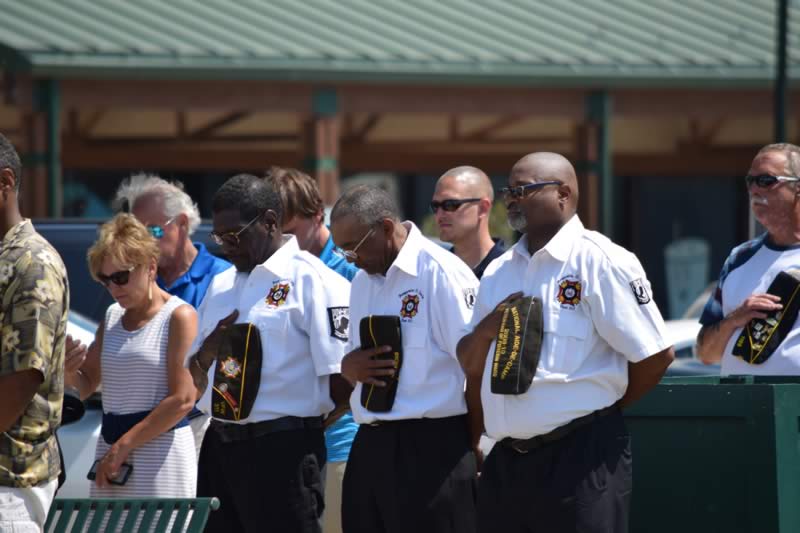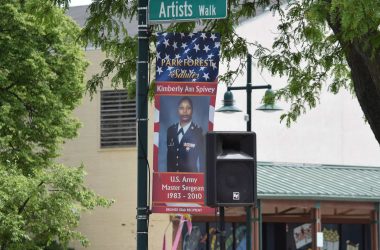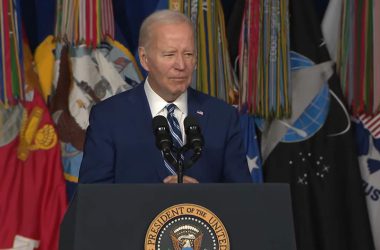Senator reports over 5,150 families nationwide – including more than 130 in Illinois – are part of the Family Caregivers Program created by his legislation
Senator also honors former Joliet resident and WWI veteran, Joseph Ambrose
WASHINGTON, D.C.–(ENEWSPF)–November 13, 2012. U.S. Senator Dick Durbin (D-IL) today said that Congress can and should do more to honor those who answer the call of duty and risk everything to defend America. Specifically, Durbin called on members of the Senate to put aside partisan differences during the lame duck session to pass the Mental Health ACCESS Act – a bill that would improve the Department of Veterans Affairs (VA)’s suicide prevention, counseling, and mental health staffing while expanding eligibility for some services to family members – and the Veterans Job Corps Act – a bipartisan plan that would put thousands of Iraq and Afghanistan veterans to work.
“For too long and on too many important issues, we in this Senate have tied our own hands with excessive rancor and partisanship,” said Durbin. “In this lame duck session, I hope we will extend a hand of cooperation across the aisle and find a fair and responsible way to meet the enormous fiscal challenges we face while we also invest in our future and honor our commitments, including those we owe our veterans.”
In his speech on the Senate floor, Durbin reported that over 5,150 families nationwide, including more than 130 in Illinois, are part of the VA’s Family Caregiver Program which provides technical, financial and practical support to family caregivers of Iraq and Afghanistan veterans seriously injured in the line of duty. The Family Caregiver Program was created by a Durbin-authored provision in the Caregivers and Veterans Omnibus Health Services Act of 2009.
Durbin also spoke about a Joliet, Illinois resident and World War I veteran whose photo is attached. In the photo, taken 30 years ago at the dedication of the National Vietnam Veterans Memorial, then 86 year-old Joseph Ambrose is wearing the same uniform he wore as a 19-year-old U.S. Army private in France in World War I. In his arms is the flag that covered the coffin of his son, who died in the Korean War. Joseph Ambrose wore his old Army “doughboy” uniform and carried his son’s flag often to Veterans Day parades and VFW conventions.
Video of Durbin’s statement will be available online later today HERE.
Audio of Durbin’s statement will be available online later today HERE.
[Text of Durbin’s remarks as prepared are below]
Remarks by Senator Richard J. Durbin
Honoring Those Who Have Served – Veterans Day 2012
We’ve heard an awful lot lately about the wealthiest one percent of Americans. On this first day in session after Veterans Day, I would like to talk about another one percent – the one percent of Americans who volunteer today to defend the rest of us.
Thirty years ago today: Dedicating “The Wall”
First, I want to say a few words about veterans of earlier wars.
Thirty years ago today, thousands of veterans of the Vietnam War came to Washington. They gave themselves the homecoming parade they deserved but almost none had ever received.
With wounded veterans in wheelchairs leading the parade, they marched up Constitution Avenue to dedicate the National Vietnam Veterans Memorial, on whose polished granite walls were etched the names of their nearly 58,000 dead and missing comrades-in-arms.
This photograph was taken at that dedication. This is Joseph Ambrose, from Joliet, Illinois.
Mr. Ambrose was 86 years old when this photo was taken. He is wearing the same uniform he wore as a 19-year-old U.S. Army private in France in World War I.
In his arms is the flag that covered the coffin of his son, who died in the Korean War.
Joseph Ambrose wore his old Army “doughboy” uniform and carried his son’s flag often to Veterans Day parades and VFW conventions.
He confessed that some years he had to go on a crash diet to squeeze back into it. But he did it to honor the veterans of the Korean and the Vietnam wars, wars he believed America was trying then to forget.
He wanted to remind us of an important truth: that no matter the outcome of a war, those who answer the call of duty and risk everything to defend America deserve the respect of a grateful nation.
Honoring today’s veterans
In the 30 years since its dedication, the Vietnam Veterans Memorial has become an almost sacred place of remembering and reconciliation and healing. And Americans understand better the lesson that Joseph Ambrose wanted to teach us.
This past weekend, in Chicago and Quincy, Illinois, and in big cities and small towns across America, communities held Veterans Day parades. Volunteers assembled “thank you” packages for troops serving overseas.
That is all good and important. But it is just a fraction of what we owe veterans.
What we’ve done
Four years ago, Congress passed the Post 9/11 GI Bill, the greatest increase in veteran’s benefits since World War II. I was proud to support that bill.
Two and half years ago, we created the Family Caregivers Act, to help veterans who survived catastrophic and disabling injuries in Iraq and Afghanistan and the family members who sacrifice so much to help care for them.
I introduced the Family Caregivers Act after meeting wounded warriors like Eric Edmundson and his parents.
Traumatic brain injuries are one of the signature casualties of the wars in Iraq and Afghanistan.
In 2005, Eric Edmundson, then a 26-year-old Army sergeant, survived a roadside blast but went into cardiac arrest while awaiting transport to an American military hospital in Germany. His brain was deprived of oxygen for nearly 30 minutes.
Doctors told his parents that Eric would spend the rest of his life in a vegetative state and that they should choose a nursing home for him. But Eric’s mom and dad refused to accept that fate for their son.
They fought for Eric to receive outstanding medical care at the Rehabilitation Institute in Chicago.
I visited Eric there several times. He worked so incredibly hard to heal. His family was with him all the time.
I will never forget the time Eric’s dad told me, “Eric has a present for you.” I couldn’t imagine what it was. Then I watched as that brave solider stood up from his wheelchair and took several halting steps.
Months later, I watched Eric Edmundson walk out of the Rehabilitation Institute.
Today, Eric lives with his wife and their two young children.
Eric’s dad, Ed Edmundson, gave up his job and the health and other benefits that came with it to help Eric regain his life.
The Family Caregivers Act helps the Edmundsons and families like them — families who make enormous sacrifices to care for their loved ones wounded in Iraq and Afghanistan. It provides these families with basic medical training, a small monthly stipend and occasional respite care.
So far, more than 130 families in Illinois and more than 5,150 families nationwide are part of the program.
More work to do
Post-traumatic stress syndrome is another of the signature wounds of these wars.
Post-traumatic stress wounds aren’t visible; they are wounds to the spirit. But they can be just as debilitating and deadly as other, more visible wounds.
We know that active duty service members are taking their own lives at alarming rates – and the suicide rate among veterans is even higher. The V.A. estimates that 18 veterans a day take their own lives.
The V.A. has made heroic efforts to keep up with the surge of mental health needs of Iraq and Afghanistan veterans. Yet, despite those efforts, only a fraction of veterans with PTSD are receiving timely, effective care.
President Obama recently issued an executive order to improve mental health care for service members and veterans. That order will expand by 50 percent the capacity of the V.A.’s crisis line, to make sure that any veteran in crisis gets professional help within 24 hours.
A bill pending in this Senate would do even more.
The Mental Health ACCESS Act was introduced by Senator Patty Murray. Senator Murray is the daughter of a severely wounded veteran and she is a fierce champion of veterans and their families.
The Mental Health ACCESS Act, which I am proud to co-sponsor, would make comprehensive improvements in the V.A.’s suicide prevention, counseling, and mental health staffing.
It would also expand eligibility for a variety of VA mental health services to family members, which is so important.
The Army says that when you draft a soldier today, you draft a family. When PTSD strikes a service member or veteran, it also strikes a whole family.
Thirty years ago, when Vietnam veterans held their own “welcome home” parade in Washington, many people lining the parade routes held signs saying, “thank you.”
A few of the veterans held signs of their own saying that what they really needed were jobs.
That is still true today. While the national unemployment rate has dipped below 8 percent, the unemployment rate for post 9/11 vets is 10 percent.
Among veterans between the ages of 18 and 24, the unemployment rate is nearly 25 percent – close to what it was for Americans during the Great Depression.
Parades are fine, but if you really want to support a veteran, hire him; give her a job.
America’s military today is the best trained, best educated military in the history of the world. We have already invested enormously to train service members and new veterans to do hard and important jobs.
The Veterans Job Corps Act is a bipartisan plan that would enable us to put that training to good use here at home.
It was introduced by Senator Bill Nelson and it has been improved by contributions of Senators from both parties, particularly Senator Murray.
We already know that President Obama will sign it because he called for an effort much like it in his State of the Union Address last January.
We weren’t able to vote on the Veterans Job Corps Act before the election. The election is over now. Let’s put aside politics and agree to pass this bill to put thousands of Iraq and Afghanistan veterans to work serving our communities and doing other important work here at home.
Veterans currently serving in Congress
On this first day back in session after Veterans Day weekend, I want to acknowledge not only the wartime service but the continued service to our nation from veterans in this chamber, including:
Senator Lautenberg, who served in World War II;
Senator Inouye, a Medal of Honor recipient from World War II;
Senator John Kerry and Senator Jim Webb, both of whom served with honor in Vietnam; and
Senator Lindsey Graham, who continues to serve as a colonel in the Air Force Reserve, and Senator Mark Kirk, who is a commander in the Navy Reserve.
New veterans elected to Congress
The elections earlier this month saw at least nine new veterans of Iraq and Afghanistan elected to Congress, bringing the total of new veterans in the next Congress to at least 16.
The people of Illinois are proud that three of those 16 veterans are from our state. In addition to Rep. Adam Kinzinger, an Air Force veteran of the Iraq and Afghanistan wars, they include two exceptional leaders who will join the next Congress.
Bill Enyart is a Vietnam veteran and former adjutant general of the Illinois National Guard.
And Tammy Duckworth is a force of nature. One of my personal heroes. She is the daughter of a Vietnam veteran, one of the first women to fly combat missions in Iraq.
She was co-piloting a Blackhawk when an RPG struck her helicopter. She lost both legs and much of the use of her right arm.
She has worked in both state and federal government positions for veterans and their families and we are so fortunate that she will soon be a member of the Illinois Congressional delegation.
Conclusion — Paul Douglas
My first boss in the Senate was a decorated and disabled combat veteran from World War II. His name was Paul Douglass.
Amazing man. He was a brilliant economist and professor at the University of Chicago. He gave up that career to take on the political machine in Chicago. He was elected to the Chicago City Council.
In 1942, he ran for the U.S. Senate and lost in the primary, resigned from the city council and, at the age of 50, enlisted in the United States Marines as a private.
The brass at the Pentagon wanted to keep him in safe, stateside desk jobs, but he fought to be allowed to serve in combat.
In 1944, he was wounded twice at the Battle of Peliliu.
A few months later at the Battle of Okinawa, machine gun fire tore through his left arm, leaving him permanently disabled.
After 13 months recuperating at Bethesda Naval Hospital he was honorably discharged with full disability pay.
But he wouldn’t accept the pay. Every month, he would send his disability checks back to the government. He joked that you can do the work of a Senator with one arm tied behind your back so it wasn’t really fair for him to take disability pay.
For too long and on too many important issues, we in this Senate have tied our own hands with excessive rancor and partisanship.
In this lame duck session, I hope we will extend a hand of cooperation across the aisle and find a fair and responsible way to meet the enormous fiscal challenges we face while we also invest in our future and honor our commitments, including those we owe our veterans.
I yield the floor.
Source: durbin.senate.gov








